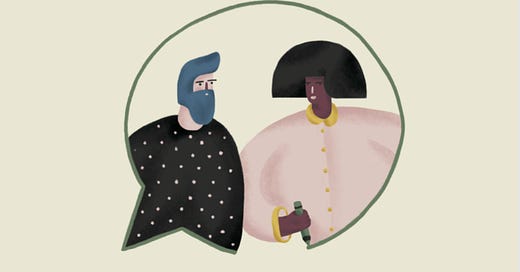Curiosity and care
People are collections of experience. Situations and encounters continuously shape our behaviour and thus, character. The way we react, think, feel and navigate the world is conditioned by our previous experiences. As adults, our self-development practices are often less about acquiring new skills, and more about freeing ourselves from behaviours that no longer serve us. By letting go of our conditioned existence (samsara, in Sanskrit) we can truly perceive what's in front of us and act from a place of freedom instead of a place of habit. In her book Maybe You Should Talk to Someone, Lori Gottlieb says that "There is no change without loss". In other words, to grow is to let go of a part of ourselves.
In community, it's only when we quiet our ego and our initial reactions, bias, conditioning and judgement that we can approach what is being said with curiosity (which comes from cura in Latin, meaning care). Author Elizabeth Alexander says that creativity is about "Choosing the path of curiosity over the path of fear". Similarly, fully listening and understanding someone is a practice that insists on quieting the ego in order to truly take someone else's experience in, and perhaps being transformed by it. Change doesn't happen without loss. Which part of you are you willing to let go of?
Correlations
How can we encourage others to be in this place of quiet ego? One way is of course by modeling it. Krista Tippett talks about asking "generous questions", which in turn offer generous answers.
Questions are powerful things. Questions elicit answers in their likeness. It’s hard to respond to a simplistic question with anything but a simplistic answer; It’s hard to rise above a combative question. But it’s hard to resist a generous question. We can ask questions that inspire dignity and honesty, and revelation.
Find out more in the On Being Better Conversations guide.
In another great Brené Brown podcast, Dr Vivek Murthy talks about how bringing people from different backgrounds or political views in the same room is not an effective way for creating dialogue. We are only willing to attempt understanding people who we already have a relationship with - neighbours, relatives, people who we are connected to sufficiently and can relate to. "Relationship is the foundation of dialogue".
Celebrations
Congrats to Ella Saltmarshe for the great The Long Time Sessions! The next event is taking place on September 3rd and will feature Toby Ord, moral philosopher at Oxford University’s Future of Humanity Institute, and Matthew Taylor, Chief Executive of the RSA. They will explore the risks to humanity's future, from the familiar human-created threats of climate change and nuclear war, to more unfamiliar threats from engineered pandemics and advanced artificial intelligence.
Congrats to David Spinks for this upcoming book The Business of Belonging!
Conversations
Conversations communities around me are exploring this week:
Do you remember a time where you rejected an idea simply because you didn't understand it and had no contact with it? How has your position changed?
How can you ask this same question more generously?
Retreats and other intense learning experiences have the highest transformational power. Now that the world has gone virtual, can we recreate some of that online?
That's all for today!
With gratitude,
Vx




